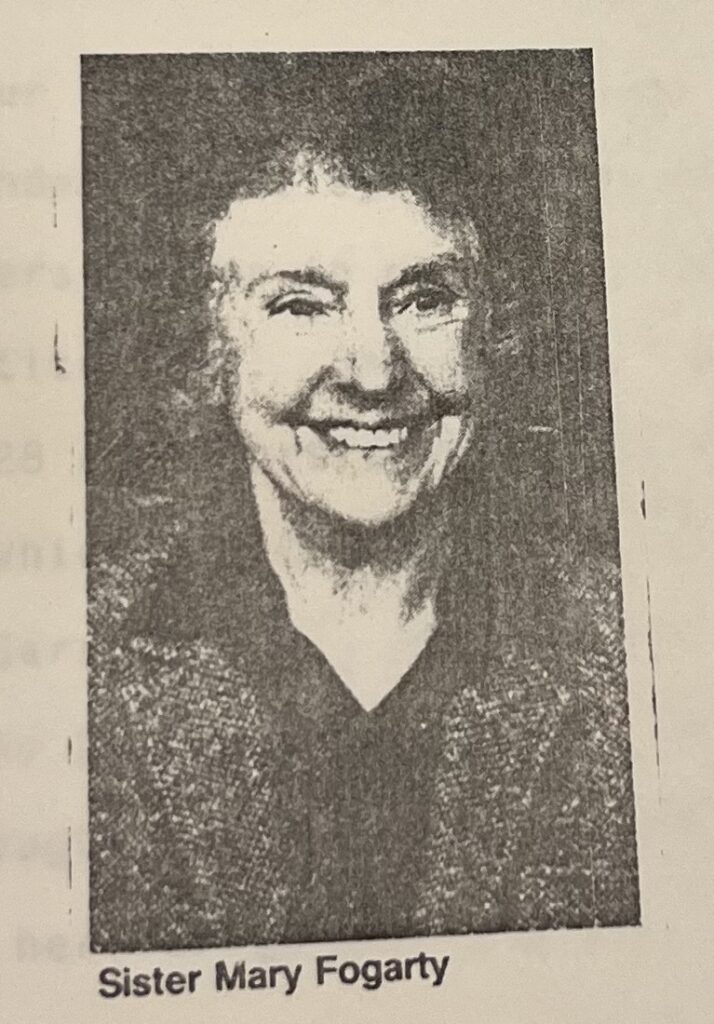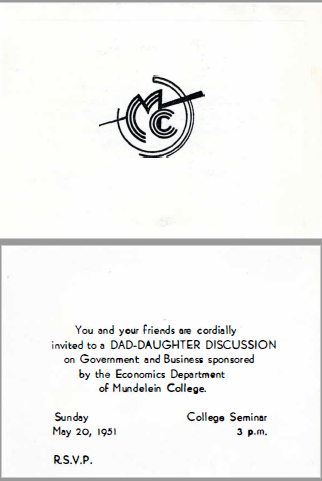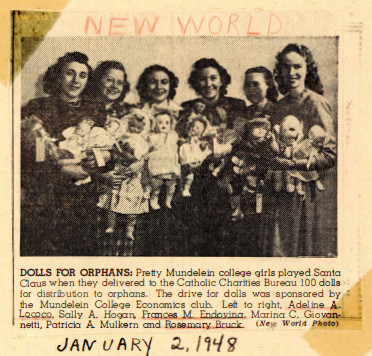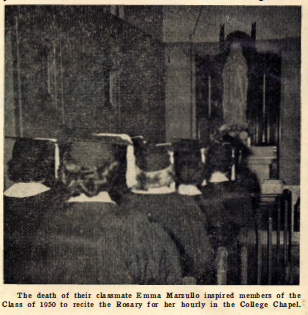During their time in college, students can participate in various activities, clubs, and extracurriculars. The number of options can be overwhelming. Extracurriculars can be a welcome invitation to expand the horizons of one’s interests or let students apply their education into real-world examples.
The Economics Club at Mundelein College gave students the opportunity to plan on-campus events and a chance to connect their faith within a larger framework. A scrapbook that was digitized during the Mundelein at 90 project highlights the work of the Economics Club throughout the 1940s and 1950s. The scrapbook includes newspaper articles, letters, meeting notes, and yearbook photographs.
During the 1940s, the Economics Club at Mundelein College thrived under the leadership of Sister Mary Gregoria Fogarty, BVM, the head of the Economics Department. In addition to teaching business and geography, Sister Mary Gregoria participated in several panels and wrote articles about business education for the Catholic Business Education Association (CBEA). She served as the secretary-general for the CBEA and chairman of the Executive board of the Midwest contingent. In 1947, the Midwest unit held the regional meeting on Mundelein’s campus. Public events like this exposed students to professionals in the field and introduced them to the work they could consider after graduation [1]. Presenters included business managers of local companies, administrators from university commerce departments, and bank vice-presidents. They discussed the role of Catholics in the business world and how students can be best prepared for the ”real-world”.
Alongside these kinds of professional developments, Sister Mary Gregoria and the Economics Club organized economic-related events for the campus community and the general public. Some of the campus activities included Father-Daughter discussions on hot topics in economics, toy drives connected with local charities, and collaborative meetings with the Economics Club at Loyola University Chicago. The intersection of academics and faith seems to be a significant one for the Economics Club. Debates considered how to navigate labor-management dynamics and how best to settle worker disputes. Many of these discussions highlighted the role of the Catholic church in economic issues.
The Economics Club hosted several Dad-Daughter discussions between club members and their fathers, many of whom worked in the business field. These discussions focused on different economic hot topics of the day. In 1947, they discussed Labor-Management Relations with the daughters representing the position of labor and the fathers representing the side of the management. They focused on the “conciliation, mediation, and arbitration to settle worker disputes”, all while considering how the Catholic Church fits into the discussion. These discussions not only flexed the students’ debate muscles, but they also could interact with real world issues [2]. Another discussion topic considered the connection and tension between security and freedom [3]. These debates came on the heels of the Taft-Hartley Act (1947) which restricted the activities and power of labor unions. Through these conversations, club members were able to put their education into practice by considering real world ethics and consequences. [4]
The Christmas Toy Drive was another annual event sponsored by the Economics Club. Starting in 1933, members of the Economics Club collected hundreds of dolls every year. These dolls were given to under resourced communities during the Catholic Youth Organization’s (CYO) Christmas party. A newspaper article described the 1958 doll drive with an emphasis on “Spreading of Christmas Cheer, Joy [as] the Goal of Economist Doll Collectors” [5]. The toy drive was a well-known service event and was frequently featured in The Chicago Tribune, The Herald-American, and The New Word. Through this event, students could provide a small gift of importance and connect with children in the community. The scrapbook contains photographs of the toy drives from 1948-1958 demonstrating its lasting imprint in the Economics Club’s history.
When tragedy strikes, it is often difficult to know how to help or respond. A section of the scrapbook is devoted to the activities of the Economics Club after the passing of a fellow classmate. Following the death of Emma Marzullo in 1950, the Economics Club strived to have her name included in the register of perpetual adoration in addition the inscription of her in the golden book of the branch of the Benedictine Convent in Mundelein, Illinois. They requested this inclusion through a donation and recitation of the rosary. The register of perpetual adoration and the Benedictine Convent were two important fixtures in their faith life. Honoring their classmate through these acts demonstrated a desire to contribute something concrete rather than merely thoughts and prayers (although those are important too) [6].
The Economics Club opened the door for students to partake in service projects and discussions to prepare them for life after graduation. Although this scrapbook only shows a fraction of the Economics Club’s history, it demonstrates the work of these women to serve their peers and the outside community.
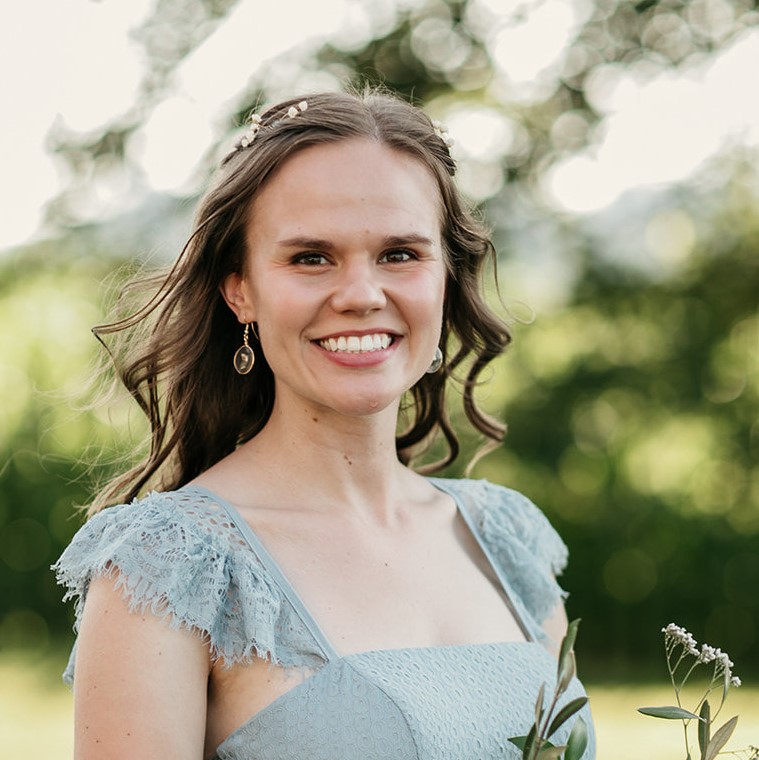
Caroline is a second-year student in the Public History MA program. In her academic work, Caroline is passionate about telling untold and underrepresented stories in US history with emphasis on the Civil Rights Movement. Within the Civil Rights Movement, she is interested in the role of women and religion. Caroline hopes to pursue a career in education, advocacy, and social justice. Outside of school, she is an avid reader, Bruce Springsteen superfan, Chicago sports enthusiast, and life-long summer camper.
Footnotes
[1] Women and Leadership Archives, Loyola University Chicago. Mary Gregoria Fogarty, BVM – Geography, Secretarial. Box 29. Folder 4, Mundelein College Records.
[2] Women and Leadership Archives, Loyola University Chicago. Scrapbook 5, Page 7, Mundelein College Records.
[3] Women and Leadership Archives, Loyola University Chicago. Scrapbook 5, Page 60, Mundelein College Records.
[4] Women and Leadership Archives, Loyola University Chicago. Scrapbook 5, Page 4, Mundelein College Records.
[5] Women and Leadership Archives, Loyola University Chicago. Scrapbook 5, Page 82, Mundelein College Records.
[6] Women and Leadership Archives, Loyola University Chicago. Scrapbook 5, Page 42, Mundelein College Records.
Images
Women and Leadership Archives, Loyola University Chicago. Scrapbook 5, Mundelein College Records.
Women and Leadership Archives, Loyola University Chicago. Mary Gregoria Fogarty, BVM – Geography, Secretarial. Box 29. Folder 4, Mundelein College Records.
Loyola University Chicago’s Women and Leadership Archives Blog is designed to provide a positive environment for the Loyola community to discuss important issues and ideas. Differences of opinion are encouraged. We invite comments in response to posts and ask that you write in a civil and respectful manner. All comments will be screened for tone and content and must include the first and last name of the author and a valid email address. The appearance of comments on the blog does not imply the University’s endorsement or acceptance of views expressed. Questions? Please contact the WLA at wlarchives@LUC.edu.

